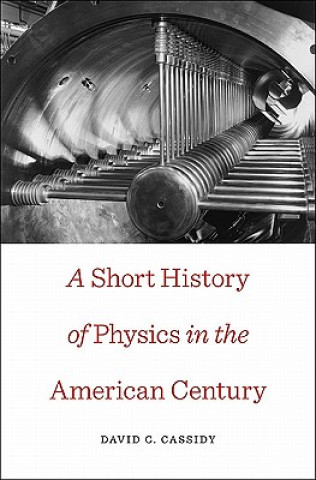
Code: 04635490
Short History of Physics in the American Century
by David C. Cassidy
As the twentieth century drew to a close, computers, the Internet, and nanotechnology were central to modern American life. Yet the advances in physics underlying these applications are poorly understood and widely underappreciate ... more
- Language:
 English
English - Binding: Hardback
- Number of pages: 224
Publisher: Harvard University Press, 2011
- More about this

79.18 €
Availability:
50/50 We think title might be available. Upon your order we will do our best to get it within 6 weeks.
We think title might be available. Upon your order we will do our best to get it within 6 weeks.We search the world
You might also like
-

The Book of Bill
23.70 € -14 % -

Gravity Falls Journal 3
16.43 € -23 % -

Berserk Deluxe Volume 1
44.28 € -12 % -

Pumpkin Spice Cafe
16.94 € -15 % -

Berserk Deluxe Volume 2
52.14 € -

White Nights
3.52 € -23 % -

It ends with us
8.67 € -19 % -

48 Laws Of Power
17.95 € -29 % -

Gilmore Girls: The Official Advent Calendar
28.84 € -18 % -

A Little Life
17.44 € -

Atomic Habits
15.93 € -14 % -

Berserk Deluxe Volume 3
48.81 € -3 % -

Jujutsu Kaisen, Vol. 23
11.09 € -15 % -

Surrounded by Idiots
10.48 € -29 % -

The 48 Laws of Power
24.50 € -5 % -

The Official Stardew Valley Cookbook
22.38 € -19 % -

Iron Flame
16.23 € -18 % -

Berserk Deluxe Volume 4
45.18 € -10 % -

A Good Girl's Guide to Murder
8.16 € -14 % -

A Curse For True Love
10.38 € -12 % -

Berserk Deluxe Volume 5
50.43 €
Give this book as a present today
- Order book and choose Gift Order.
- We will send you book gift voucher at once. You can give it out to anyone.
- Book will be send to donee, nothing more to care about.
Availability alert
Enter your e-mail address and once book will be available,
we will send you a message. It's that simple.
More about Short History of Physics in the American Century
You get 199 loyalty points
 Book synopsis
Book synopsis
As the twentieth century drew to a close, computers, the Internet, and nanotechnology were central to modern American life. Yet the advances in physics underlying these applications are poorly understood and widely underappreciated by U.S. citizens today. In this concise overview, David C. Cassidy sharpens our perspective on modern physics by viewing this foundational science through the lens of America's engagement with the political events of a tumultuous century. American physics first stirred in the 1890s--around the time x-rays and radioactivity were discovered in Germany--with the founding of graduate schools on the German model. Yet American research lagged behind the great European laboratories until highly effective domestic policies, together with the exodus of physicists from fascist countries, brought the nation into the first ranks of world research in the 1930s. The creation of the atomic bomb and radar during World War II ensured lavish government support for particle physics, along with computation, solid-state physics, and military communication. These advances facilitated space exploration and led to the global expansion of the Internet. Well into the 1960s, physicists bolstered the United States' international status, and the nation repaid the favor through massive outlays of federal, military, and philanthropic funding. But gradually America relinquished its postwar commitment to scientific leadership, and the nation found itself struggling to maintain a competitive edge in science education and research. Today, American physicists, relying primarily on industrial funding, must compete with smaller, scrappier nations intent on writing their own brief history of physics in the twenty-first century.
 Book details
Book details
Book category Books in English Humanities History Regional & national history
79.18 €
- Full title: Short History of Physics in the American Century
- Author: David C. Cassidy
- Language:
 English
English - Binding: Hardback
- Number of pages: 224
- EAN: 9780674049369
- ID: 04635490
- Publisher: Harvard University Press
- Weight: 431 g
- Dimensions: 235 × 155 × 23 mm
- Date of publishing: 25. September 2011
Collection points Bratislava a 2642 dalších
Copyright ©2008-24 najlacnejsie-knihy.sk All rights reservedPrivacyCookies


 15549 collection points
15549 collection points Delivery 2.99 €
Delivery 2.99 € 02/210 210 99 (8-15.30h)
02/210 210 99 (8-15.30h)